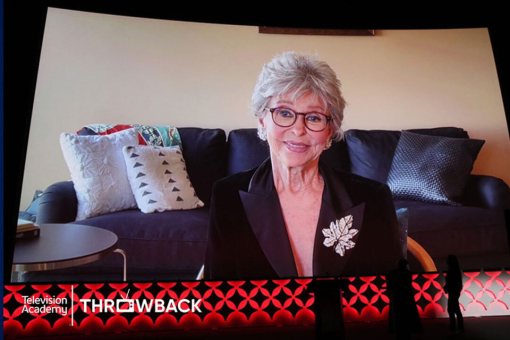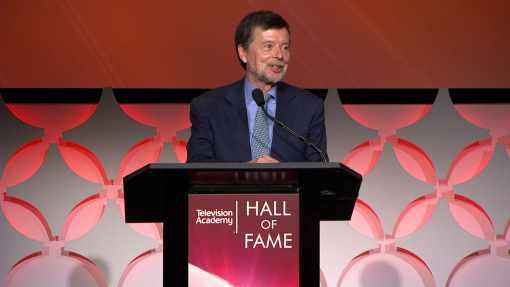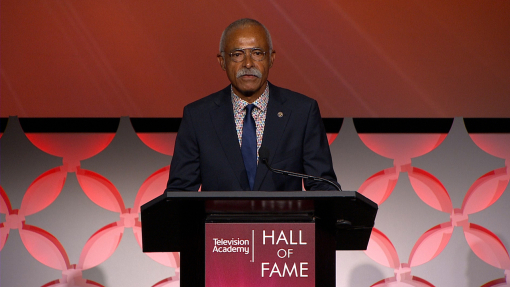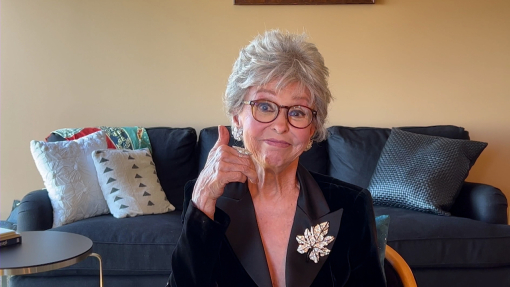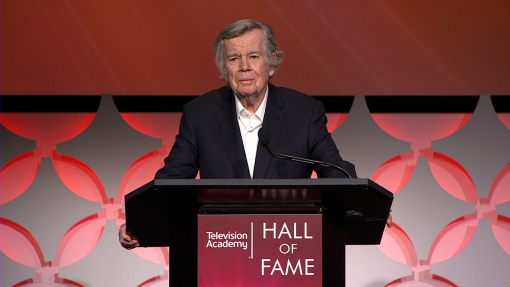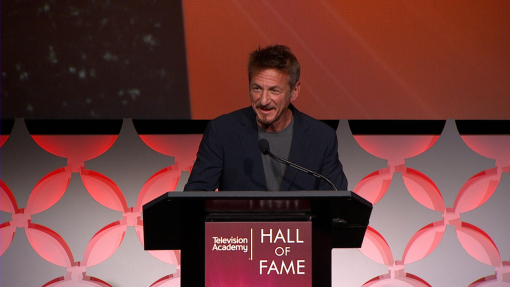Television likes Betty White. It likes her the way laughter likes the Marx Brothers, the way bad jokes like stand-up comics, the way hair dye likes Madonna.
The only reason Betty was not on television for the first 24 years (or so) of her life is that it didn't exist. Her first Emmy Award came around the time they first gave the icons out — in 1952, for Life With Elizabeth. One gets the idea, reviewing her 46-year career, that the day White stops appearing in front of TV cameras, TV goes out of business. It seems to require her presence.
She first went on the tube for a song, literally. It was 1949 when she stepped in front of the klieg lights one summer day at the Los Angeles station KLAC ("Lucky 13") and warbled "I'd Like to Get You on a Slow Boat to China" as an unpaid guest on a variety special.
If you want to get technical, her real TV debut came 10 years earlier, when an experimental broadcast beamed White's smile from the sixth floor of the Packard Building in downtown L.A. all the way to … the first floor.
That's right, you can say with accuracy that Betty White actually had a little hand in the very development of what she calls "the little box in the corner." As her late husband, Allen Ludden (a TV bulwark in his own right as 20-year host of the beloved game show Password), used to say, "Meet my wife — one of the pioneers in silent television." (The password is … quip.)
Oh-so-durable White has had about every TV job imaginable: singer, hostess, comedienne, sitcom co-star, sitcom star (several times over), much-indemand game show/talk show fixture. She pioneered the female-principal sitcom in the '50s, along with the likes of Gale Storm, Eve Arden, and Joan Davis. She was offered Barbara Walters' slot (pre-Babbs, mind you) on The Today Show in the mid-'60s (turned it down because she didn't want to trade native L.A. for New York); and was so ever-present on What's My Line?, The Jack Paar Show (75 appearances) and To Tell The Truth that you had to wonder if she was triplets. She helped make The Mary Tyler Moore Show one of the great television sitcoms in history during the '70s, and through the '80s helped secure the popularity of The Golden Girls. The '90s find her playing Marie Osmond's free-spirited mom on ABC's Maybe This Time. A more genial, charmingly saucy female presence has simply never inhabited that cathoid ray device. When Elvis blew out his Zeniths and Motorolas with that shotgun, you can bet he wasn't watching Betty White.
Lucky for television — and possibly opera — White could never cut it as a soprano.
"Well, I studied with Felix Hughes, who was Rupert Hughes' brother and Howard Hughes' uncle. I was so serious about it," she said briskly, throwing some things into a suitcase before zipping off for a national media tour promoting her delightful new autobiography, Here We Go Again. “I was 14, and that's not necessarily the time to start training for opera. I knew you had to do your preparation early, and I worked very hard. I still know all the arias, and I still love them with all my heart.”
She had discovered opera through the movies of Lawrence Tibbet and Grace Moore ("I thought, 'Gee that's pretty music!"'); The Victor Book of the Opera, she said, was her Bible. She had all the love and enthusiasm for the pursuit necessary. One hitch: vocal chords.
"I was going for the dramatic soprano and coloratura. I could hit F above high C, and I was so proud," she said, still sounding rather pleased about it. "The only problem was it probably didn't sound very good. The voice just wasn't that big. … Also, somewhere in there, I think I discovered boys and all kinds of other good stuff."
Boys, indeed. As for the old question about the similarity between passive/aggressive, libidinous Sue Ann Nivens and Betty, suffice to repeat the explanation of longtime husband Ludden: "They're the same person, except Betty can't cook."
Doubters of this assertion need look no further than her casting as Sue Ann, the "neighborhood nymphomaniac" of the superb Mary Tyler Moore Show. It was a role, not incidentally, that initially called for a Betty White parody, which called into play one of the great qualities an actor (or a human being) can have: a sense of humor about yourself! As White recently told National Public Radio:
“Sue Ann was going to be a one-shot, and they wanted a sickeningly sweet Betty White type. So the casting director said ‘Why don't you get Betty?’ And they said ‘Oh no, Betty and Mary are friends, we can't do that.’ They kept interviewing actresses, and couldn't find anybody yucky enough, so they said, ‘Well, might as well give the part to Betty.’”
She was born Bettina Whittenhuffel — no, not really! Betty White is the actual name bestowed on her by Tess and Horace White, back in the days when her hometown, Hollywood, was quiet and civilized. It is tempting to speculate that her resilience and energy — personal and professional — stems from a very happy and supportive childhood. An only child childhood. Tess and Horace were her best friends:
“I can't sell being an only child more, because you get to tune into things that, when you've got brothers and sisters, you can't," she said. “It's one group against the tall people. This way I was able to relate better to a lot of stuff. You're friends with your parents … You can go one-on-one with them. I won't say I was a spoiled only child. If spoiled meant loved, I was terribly spoiled … I started learning before I went to school. Just the process of learning was an adventure, as opposed to now where it's often, ‘How little I can get away with?’”
It was way back at Horace Mann Grammar School that she discovered acting — by writing. Dreaming of a career as an author (she has fulfilled that with several books), she wrote the graduation play — and, of course, "as any red-blooded American girl would," wrote a part for herself. The lead.
"I got on stage, and I thought, ‘Ohhhhh! How long has this been going on?’ I guess the show biz bug bit me then."
She sang at her graduation from Beverly Hills High School, spent four years in the American Women's Voluntary Services during World War II (driving a PX truck), dabbled in acting at a local playhouse, and finally broke into radio (she pronounced the word, "Parkay" — flawlessly — during a commercial on The Great Gildersleeve) at the encouragement of her then-husband, actor/agent Lane Allen. ("It was 'Can you sing?' Oh, yes. 'Can you juggle?' Oh, yes. 'Can you fly to the moon?' Oh, yes. Then you go out and try to learn it before they call upon you.") Not long after came The Slow Boat To China debut on KLAC, a small part on a game show, and a guy named Al Jarvis.
"Al had seen me on a couple of programs, and asked if I would be his girl Friday," said White, “and I thought, ‘Oh, keen,’ because I was making $20 a program, and I thought, ‘Oh, another $20, that's wonderful!’ Well, Al also meant his girl Monday, Tuesday, Wednesday, Thursday. We were on television 33 hours a week, live — no preparation, no nothing! You just went out and took your chances.”
Jarvis was a big-time disc jockey-tumed-TV-personality who concocted a program called Hollywood on Television — a kind of TV version of his radio show. He didn't offer White an extra $20 — he offered a breathtaking 50 bucks a week, essentially to be his sidekick. Wrote White in Here We Go Again: "I had no way of knowing that my lifelong love affair with television had begun." And vice-versa. Viewers took to Betty and Al's banter with such zeal that within a few weeks the pair was doing more talking than playing records, and the show got a huge marketing push from station manager Don Fedderson (whom White credits, along with Jarvis, for shaping her career). The lady's salary went up to $300 per week.
The rest wasn't exactly gravy — with four separate Betty White Shows under her still petite belt, White is no stranger to cancellations. But for the most part, there wouldn't be any big chunks of Betty-less TV time in the future. During the Jarvis period, a parade of great figures began to march in and out of her sphere of TV guests. She was, to her astonishment, soon able to count as friends: Fred Astaire, John Steinbeck, Helen Hayes, George Burns, Lucy (there's only one), Jimmy Stewart, even marvelous Buster Keaton, who occasionally dropped by H.O.T. to chat — one day nearly mining White's rendering of a Thrifty Drug Store commercial. Seems she had to display sales items on an easel, and Keaton spontaneously wandered over — live TV, remember — and became engrossed with each item, examining them minutely. Miss White writes:
The spot must have run 10 minutes … As really funny as Buster was, I was a little anxious, hoping that Thrifty would think so too and not be upset, or heaven forbid, cancel the account! … If only tape had been invented at the time. I'd sell my soul to see it today.
Today, though she would dispute this, White has become one of those iconographic celebrities herself. She's long been a household word; her gracious demeanor and comic timing (there's usually an extra beat or two before the zingers) have endeared her to millions. She's "absolutely dumbfounded" at the idea of being in the Hall of Fame because “I've always been sort of a team player and stuff — I mean, there have been four Betty White Shows, but I'm not like a Mary Tyler Moore, or a Carol Burnett, or that kind of thing. It's incredible I've done as many series and managed to still keep 'em fooled.”
She first fooled 'em with: the Betty White Show, a homey little variety show (co-starring Bandit the Pekinese) on Sunday nights during the H.O.T. period; next with Life With Elizabeth — a live sitcom from the Music Hall Theater in Beverly Hills with White's great foil, Del Moore; Betty White Show #2, in 1954 — a half-hour network (NBC) variety/talk show (concurrent with Elizabeth) that ended with White singing "It's time to say 'goodbye' again/Till we say 'Hi' again/So-o-o long …"; 20 years of Rose Parade narrations; a sitcom called Date with Angels that was later retooled as BWS #3; over a decade's worth of spots on the greatest TV game shows to date, thanks partly to her good friend and game show mogul Mark Goodson ("Oh, I lo-o-ove games," she said, "especially word games, and they're hard to come by. Growing up, my folks and I would play games around the table, in the car, make up games about everything!"); the Mary Tyler Moore Show; the shortlived MTM spinoff, BWS #4; The Golden Girls, and now Maybe This Time.
The only time she didn't fool 'em, to buy her interpretation of events, was with Betty White Show #4, a tale of a great pilot followed up by a few less-great shows. Seems the original pilot team had other fish to fry, and BWS #4 was never able to stabilize writers/directors/characters, etc. It was, she said, a "heart-wrenching" time — offset partially by a later stint on the Carol Burnett Show (she was Ellen, Eunice's "spoiled, rich, bitchy sister"), summer stock, and spots on The Tonight Show.
Devastated by the passing of her genteel Allen Ludden in 1980, White lost herself in work. "I thank God for the business I'm in," she writes. She guested on a number of episodes of Mama's Family, with Vicki Lawrence, and dedicated herself anew to helping bird and beast by working for the Los Angeles Zoo and the Morris Animal Foundation, which funds studies into animal diseases. In 1983 came her first book, for William Morrow and Co., Betty White's Pet Love ("Their title," she will tell you, "not mine"). It was all about animals used in therapy — guide dogs, hospice cats — and how they aid and comfort all manner of afflicted persons. (It was a natural; White's work on behalf of animals is celebrated. As she put it, “I've been an animal freak all my life. I inherited it naturally from my folks. I was an only child, and I think they were so disappointed when I only had two legs and no tail. They put up with me anyway.”
Betty White: In Person was next, an autobiography emphasizing her personal life. Along wandered a script for The Golden Girls, which "knocked my socks off," and White, as well-intentioned Rose Nyland, was suddenly a bigger hit than ever.
"I like Rose Nyland the best of all my characters," she said flatly. "Sue Ann is a close second. Rose was not dumb, just terminally naive."
Rose's punchlines were timed rather like Los Angeles city buses — always a little later than you think. Audiences came to relish anticipating them.
"It's a rhythm," White told NPR, of her timing, "that you have to kind of feel inside somewhere. If you add an extra word or syllable, you'll kill the laugh. You can't explain to anybody. I'm sure comedy teachers can't."
Whatever it is, it's worked for this woman far longer than any other femme in the history of the medium. As her old friend Grant Tinker said, "Betty's television work over the years represents one of those rare occasions when quantity and quality are one and the same."
Dick Clark, who has known the lady for over 30 years, speculated that her timing was honed on early live TV, and on game shows, where the quick rejoinder is king. "She knew how to take a moment and make it play," said Clark. “It was always an ad-lib situation. That's where I got to appreciate her ability to use her mind. I guess it's a matter of whatever they put her into, she always comes out on top. They stick her in a situation comedy with older women in a house, and The Golden Girls is a big hit. Give her her own show, and it's a hit. Stick her on a game show as a guest regularly, and it works. No matter what happens to her, it always works. I would think by now her audience runs the full demographic gamut.”
One more observation must be made here. White has worked hard at remaining a realist while excelling beyond her expectations in a make-believe world. Please turn to page 55 of Here We Go Again. She writes:
Who is my watchdog today? My folks are gone, as is Al; my husband, Allen, always my benign critic, is gone; friends mean well but aren't reliably objective, and they have a tendency, I suspect, only to tell me what I want to hear. The fact that I have lived a long time doesn't mean that I'm any better at selfappraisal than anyone else. As time goes by and I find my acceptance has increased, I realize, and it's a chilling thought, that there is no governor on the accelerator and my ego is at the wheel. I try to keep that very much in mind at all times.
To which one might only add the following thought:
Let it drive for a while, Betty. And put the pedal to the metal.
This tribute originally appeared in the Television Academy Hall of Fame program celebrating Betty White's induction in 1995.

